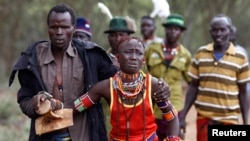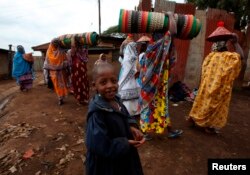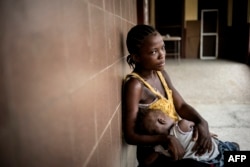Khady Faye was 11 when her mother told her she would soon be getting married.
“There was a party but I didn’t go. Everyone made beignets, but I went into the forest and cried. I stayed there until dark, " she recalls.
Faye soon found out she was pregnant. Her family supported her decision to divorce her husband and took in her son when he was born.
But her life had been upended.
West and Central Africa have the highest prevalence rates of child marriage on the continent, and the second highest in the world behind South Asia.
Reversing this trend could have major economic benefits, according to experts taking part in high-level meetings in Senegal this week aimed at reinvigorating the campaign to end child marriage in the region.
Lost childhood
Faye says she felt too old to go back to school after her divorce. She didn’t want to be in the same class as her little sister so she stayed home to help her mother.
She eventually left her village in the Fatick region of southwest Senegal and end up on the streets. VOA met Khady at the Maison Rose, a shelter for girls and women on the outskirts of Dakar. She is now 23 years old with limited prospects.
Experts gathered in Dakar are taking aim at the economic impact of child marriage.
West and Central Africa is home to six of the 10 countries with the highest prevalence rates worldwide. According to UNICEF, four in 10 girls in the region are married before the age of 18.
In a new study, the World Bank says by 2030, the annual benefit from ending child marriage could reach well above $60 billion for West and Central Africa.
“When they marry as children, before the age of eighteen, they tend to have more children over their lifetime and also more children earlier," said Quentin Wodon, a lead economist for the World Bank. "So that reduction in fertility has an impact on population growth, and what happens is that if you reduce population growth, then GDP per capita will increase."
The World Bank estimates that by 2030 governments would also see a benefit of $5 billion annually due to reduced under-five mortality and stunting, both seen as related to early childbearing.
Earning potential
The study also looked at the current earning potential of women like Khady who were child brides. In the six countries that account for two-thirds of the region’s population, the World Bank found that women married as girls have lost out on over $8 billion in income and that amount is likely to rise if trends continue.
But economic conditions in the region also help keep the practice alive, says Mabel van Oranje, the chair of Girls Not Brides, a global partnership working to end child marriage.
“I think it has to do partially with the enormous levels of poverty here. It also has to do a lot with social norms, tradition. You know it’s an honorable thing to make sure that your daughter is married at a young age, and parents think that they do the right thing,” she said.
She adds that so far only four West and Central African countries have developed national strategies to end child marriage – Nigeria, Burkina Faso, Ghana and Chad.
Action plan
The World Bank hopes that highlighting the economic impacts of child marriage could push African governments to act.
“The findings help us in terms of advocating for funding from the legislative sector so that we get money allocated to these areas,” said Hadiza Amino, a technical adviser to Nigeria’s vice president..
Last year, Nigeria implemented a plan to end child marriage by 2021. But the country is still predicted to have the continent's highest number of child brides by 2050.
At current rates of progress, the U.N. Children’s Fund says it will take over 100 years to eradicate child marriage from West and Central Africa. UNICEF say getting girls to school and keeping them there as long as possible is one of the best strategies for reversing the trend.












